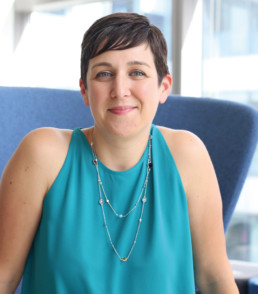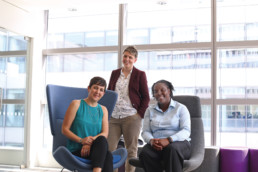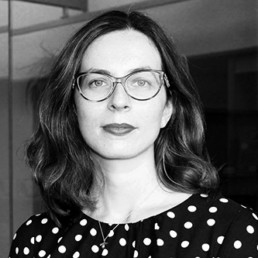Last year saw Cass Business School launch the Global Women’s Leadership Programme, which aims to equip women with all the tools they need to fulfil their career ambitions. Amy Ripley meets the Director of the programme and two of its scholars for insights into why the scheme is so important.
Many women aspire to leadership roles at work but are unsure how to apply for them. They know that it is important to aim high and have a successful and fulfilling career but how can they learn, develop and nurture the skills that will get them to where they want to go?
These questions have been given a great deal of consideration at Cass Business School. Last year, the Dean, Professor Marianne Lewis, decided she wanted to establish a flagship initiative to develop women’s leadership skills at Cass. The Global Women’s Leadership Programme was launched, under the direction of Dr Canan Kocabasoglu-Hillmer, a longstanding advocate for women’s empowerment and an expert in supply chain management.
Canan, who was born in Turkey, grew up in Germany and was educated in the US, began her academic career at the University of Kansas as an Assistant Professor in Operations and Supply Chain Management. While she was there, she served as the mentor for the American Business Women student chapter, which organised events to educate its members on coping strategies for women in the face of workplace challenges. Everything from balancing a career with family life, grappling with the gender pay gap, navigating traditionally male-dominated industries or dealing with harassment at work.
“My experience with that chapter and those ambitious undergraduate students at the beginning of their career instigated my lifelong commitment to the professional advancement of women,” she says.
According to Canan, the purpose of the programme is to ‘inspire, equip and connect’ women throughout their career, from undergraduate to postgraduate to alumnae and beyond.
“We inspire by fostering ambition through events with stimulating speakers. We equip by helping women develop skills, competence and resilience, either through workshops or by offering financial support to study at Cass. Finally, we connect women via networks, groups and communities supporting each other. All of these things encourage women to develop leadership skills and give them the confidence to apply for those roles or lead within their current role,” she says.
“Our programme provides our students and alumnae with a platform to develop the leadership skills they need and learn from women who are at the top of their game.”
In its first year, the programme awarded four scholarships, funded
by the Coca-Cola Foundation, to Artis Kakonge (Modular Executive MBA, London), Kylie Poole (Executive MBA, London), Esra Baykal (Executive MBA, Dubai) and Renee Kroner (Full-time MBA, London). The existing scholars were recently joined by Cassie Newman, a London Modular Executive MBA scholar.
Serving as leaders within their respective programmes, the scholars develop and practise their leadership skills by coordinating development events spanning across London, Dubai, Hong Kong, Beijing and New York.
The issues surrounding women, work and leadership are complex. According to the Office of National Statistics, more women are working today than ever before, with over 70 per cent of women aged 16-64 in employment. The state pension age for women also rose recently from 63 to 65 and is expected to rise again by 2020 to 66, meaning that women will be working longer, making it even more important to be happy at work.
However, although the number of women on boards has increased slightly (from 11 per cent to 28 per cent from 2007 to 2017, according to a 2017 Cranfield School of Management report), women are still falling behind in leadership positions. Earlier this year, Women in Business, a 2018 report by Grant Thornton, found that women held just 22 per cent of senior leadership positions.
It is this imbalance that the programme seeks to address, says Canan. “We need to see a dramatic increase in the number of women in leadership positions. We need to ensure a gender balance to make sure that our institutions – whether they are banks, businesses, charities or government – reflect society as a whole and encourage a breadth of perspectives and original thinking.
“At Cass we lead by example and our programme provides our students and alumnae with a platform to develop the leadership skills they need and learn from women who are at the top of their game. We are here for Cass women at every stage of their career and beyond.”
Artis Kakonge is a barrister specialising in children’s and family law at Garden Court Chambers and was the first scholarship recipient of the Global Women’s Leadership MBA Scholarship.
She holds joint American and British citizenship and grew up in East, West and Southern Africa. After reading Law, she went on to gain an MSc in Criminal Justice Policy and an LLM in Law and Development. She was called to the Bar in 2006 after completing the Bar Vocational Course at the Inns of Court School of Law (now The City Law School).
Artis decided to study for an Executive MBA (EMBA) and apply for the scholarship after opting to diversify her skill-set to ensure longevity in her career. Choosing a Cass EMBA meant she could continue working while studying part-time.
“I saw how the implementation of cuts to legal aid in 2010 changed the market for children’s law services dramatically,” she says. “It is a much more competitive arena and we must now be much more business-minded, doing more with less and finding creative solutions to deal with dwindling budgets.
“I realised that in the long-term, specialist legal knowledge was insufficient to progress my career or to deal with the current challenges that I faced. I noticed that lawyers who were now senior executives in the public sector had an MBA and considered it a good investment.”
Her involvement with the programme has also given her the impetus to develop the leadership skills she needs to have an impact in the public sector.

“There is currently a ‘diversity deficit’ in the public and voluntary sectors in the UK, particularly at executive level. I think it is important for women to be equally represented in leadership roles and I thought this scholarship would help me break the glass ceiling. I was also attracted to the aims of the initiative and could relate to the importance of good leadership in working with marginalised communities,” she says.
Artis recently organised one of the programme’s flagship events, titled ‘Respect at Work: When to command it and when to demand it’. She was joined by Alison Maitland, an Honorary Senior Visiting Fellow at Cass, co-author of Why Women Mean Business and a former Financial Times journalist; Catrin Lewis, a barrister specialising in employment and discrimination law at Garden Court Chambers; and Kate Grussing, founder of executive search firm Sapphire Partners. The panel reflected on their experiences throughout their careers and answered questions from the audience on overcoming the challenges that women typically face in the workplace.
Cassie Newman is the newest programme scholar and the Head of Interventions for London Community Rehabilitation Company (LCRC), the largest private sector probation provider in England. Cassie, who grew up in London and holds a BSc in Criminal Justice and a master’s degree in Public Protection, chose to apply for the programme to broaden her experience and learn how to apply private sector knowledge to the public sector.
“Some aspects of probation work were recently privatised and so I am now working for a private sector company delivering public services. I was looking at doing either a PhD or an MBA for a few years. The PhD would have been very specific to criminal justice but I knew that an MBA would widen my knowledge and give me the skills from a variety of industries in the private sector which would add more value to the work I was delivering for the public sector,” she says.
"There is currently a ‘diversity deficit’ in the public and voluntary sectors in the UK, particularly at executive level."
She says the MBA has already proved useful in terms of developing her leadership skills and giving her a different perspective on her career.
“I’ve been here three months and have already learnt more than I could have hoped for. The quality of tuition is superb and the diversity of my classmates has increased the benefits of attending. Studying for an MBA and my involvement in the programme is giving me the confidence to apply for jobs I would never have thought about before,” she says.
The programme is now extending its scholarships to undergraduate and
MSc students. Canan is keen to encourage women to apply and suggests interested parties keep an eye on the programme’s website for the next application deadlines. She says the programme offers valuable support and career development for women from a range of backgrounds (both private and public sector) and says the main criteria is genuine ambition and commitment to empowering yourself and other women at Cass.
“Every day we meet women who go on to succeed because they allowed themselves to dream big and chipped away at that dream one day at a time. Having a big dream allows us to have ambitious goals and working in small steps can help us not get overwhelmed. Allow us – the programme and Cass – to be your security net,” Canan says.
Artis says that after she graduates she anticipates she will be able to take on more management responsibility, creating policy and improving the profile of public sector legal services, in the process.

“It is particularly important to me to raise the profile of public sector legal services because of the important work that is done by social workers and child protection lawyers to achieve better outcomes for children at risk and their families. They are very hard-working people whose efforts are often unrecognised,” she says.
In the long-term, Artis aims to start her own law firm, specialising in children’s law. She says: “This will involve business development; formulating a business and marketing strategy; monitoring compliance with regulatory bodies; the recruitment and mentoring of lawyers – all topics that I will have covered in my EMBA. I want to contribute more to the wider community by ensuring greater access to justice: the very reason I became a barrister.”
Cassie says she is delighted with the breadth of experience that her MBA is giving her. She is still deciding exactly what she’d like to do once she graduates but is clear that she already feels she is developing the skills that will get her where she needs to go.
“Whatever I do and whoever I work for, it will need to have a positive impact on someone or something. I would welcome the opportunity to diversify my experience and bring what I have learnt to other aspects of the public and not-for-profit sectors, but equally I would love to run my own business. I am hoping that the MBA will help me to answer some of these questions over the next two years,” she says.
Canan says it is very rewarding to see the impact that the programme has had on Artis and the other scholars and also witness Cassie at the start of her journey at Cass.
She says: “Artis, Renee, Esra, Kylie and Cassie are inspirational women and the leaders of tomorrow. They exemplify the best of Cass: tenacity, integrity and compassion. It is very rewarding to watch them progress through the programme and see them develop and thrive.”
The Cass Global Women’s Leadership Programme offers scholarships and leadership opportunities for high potential women and runs regular networking and development events. Forthcoming dates include an In Conversation event with Inga Beale, CEO of Lloyd’s of London on 24th October 2018 and an event with Jane Leslie, Vice President and Senior Portfolio Manager, Global Fixed Income and Currencies, Royal Bank of Canada on 26th November 2018. To find out more, visit: cass.city.ac.uk/global-womens-leadership

Contributor:
Amy Ripley is a Senior Communications Officer for Cass Business School. She trained as a journalist at the University of Technology Sydney and has freelanced for the Sydney Morning Herald, The Daily Telegraph and BBC World Service.